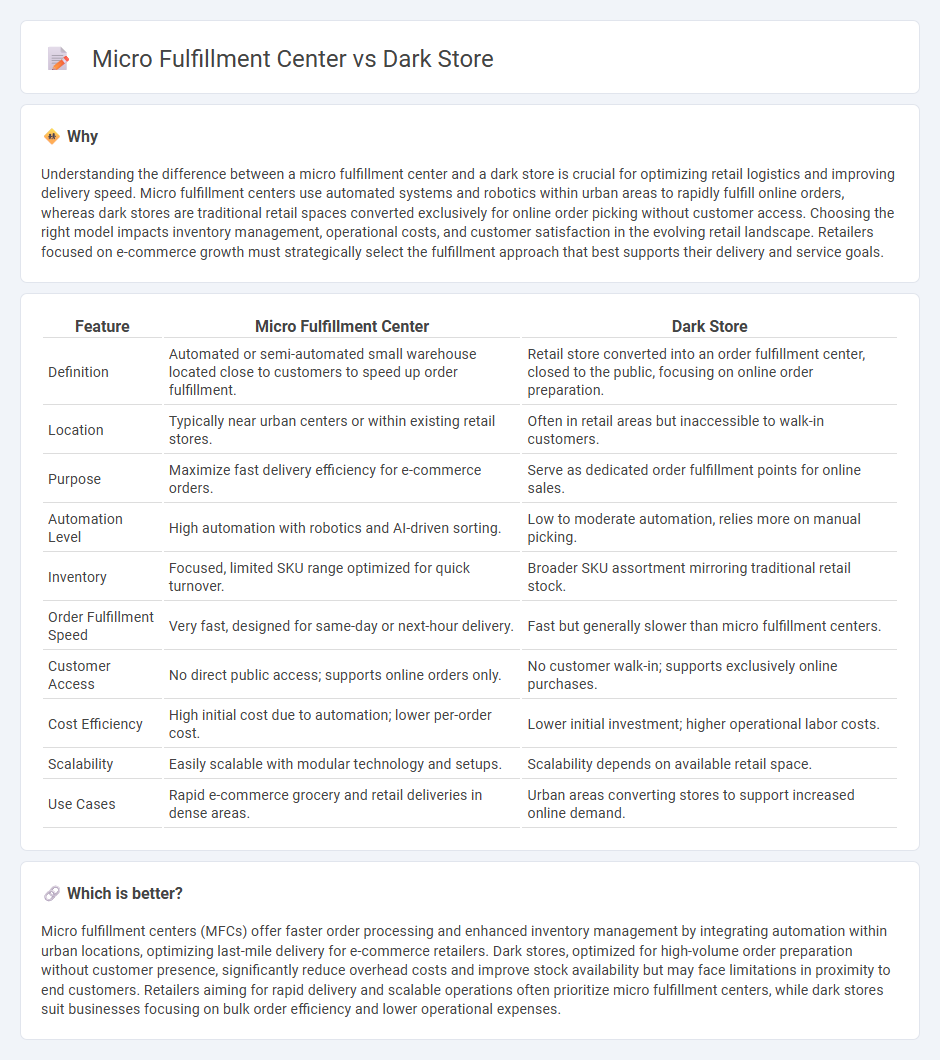
Micro fulfillment centers streamline last-mile delivery by using automated systems within urban areas to quickly process and pack online orders. Dark stores serve as localized retail warehouses that are closed to the public and optimized for fulfilling e-commerce and delivery orders efficiently. Discover how these innovative retail solutions are transforming customer experience and supply chain logistics.
Why it is important
Understanding the difference between a micro fulfillment center and a dark store is crucial for optimizing retail logistics and improving delivery speed. Micro fulfillment centers use automated systems and robotics within urban areas to rapidly fulfill online orders, whereas dark stores are traditional retail spaces converted exclusively for online order picking without customer access. Choosing the right model impacts inventory management, operational costs, and customer satisfaction in the evolving retail landscape. Retailers focused on e-commerce growth must strategically select the fulfillment approach that best supports their delivery and service goals.
Comparison Table
| Feature | Micro Fulfillment Center | Dark Store |
|---|---|---|
| Definition | Automated or semi-automated small warehouse located close to customers to speed up order fulfillment. | Retail store converted into an order fulfillment center, closed to the public, focusing on online order preparation. |
| Location | Typically near urban centers or within existing retail stores. | Often in retail areas but inaccessible to walk-in customers. |
| Purpose | Maximize fast delivery efficiency for e-commerce orders. | Serve as dedicated order fulfillment points for online sales. |
| Automation Level | High automation with robotics and AI-driven sorting. | Low to moderate automation, relies more on manual picking. |
| Inventory | Focused, limited SKU range optimized for quick turnover. | Broader SKU assortment mirroring traditional retail stock. |
| Order Fulfillment Speed | Very fast, designed for same-day or next-hour delivery. | Fast but generally slower than micro fulfillment centers. |
| Customer Access | No direct public access; supports online orders only. | No customer walk-in; supports exclusively online purchases. |
| Cost Efficiency | High initial cost due to automation; lower per-order cost. | Lower initial investment; higher operational labor costs. |
| Scalability | Easily scalable with modular technology and setups. | Scalability depends on available retail space. |
| Use Cases | Rapid e-commerce grocery and retail deliveries in dense areas. | Urban areas converting stores to support increased online demand. |
Which is better?
Micro fulfillment centers (MFCs) offer faster order processing and enhanced inventory management by integrating automation within urban locations, optimizing last-mile delivery for e-commerce retailers. Dark stores, optimized for high-volume order preparation without customer presence, significantly reduce overhead costs and improve stock availability but may face limitations in proximity to end customers. Retailers aiming for rapid delivery and scalable operations often prioritize micro fulfillment centers, while dark stores suit businesses focusing on bulk order efficiency and lower operational expenses.
Connection
Micro fulfillment centers and dark stores are interconnected solutions in retail logistics that optimize inventory management and speed up order fulfillment within urban areas. Micro fulfillment centers utilize automation and compact warehouse layouts to efficiently process online orders, while dark stores function as dedicated retail spaces closed to the public, serving exclusively as local distribution hubs. Together, these facilities enable retailers to enhance last-mile delivery efficiency, reduce lead times, and improve customer satisfaction in e-commerce operations.
Key Terms
Order Picking
Dark stores and micro fulfillment centers both prioritize efficient order picking to streamline e-commerce fulfillment. Dark stores function as dedicated retail spaces converted into localized warehouses, enabling quick picking for high-demand urban orders with a focus on speed and inventory accuracy. Explore the nuances of order picking strategies and technology used in both models to optimize your supply chain operations.
Inventory Management
Dark stores operate as inventory hubs solely dedicated to fulfilling online orders, enhancing stock accuracy and enabling real-time inventory updates. Micro fulfillment centers integrate advanced automation and robotics to optimize inventory turnover, reduce storage space, and speed up order picking processes. Explore more to understand how these models revolutionize inventory management efficiencies in e-commerce.
Last-Mile Delivery
Dark stores and micro fulfillment centers (MFCs) both optimize last-mile delivery by positioning inventory closer to urban consumers, drastically reducing delivery times. Dark stores operate as retail-like warehouses dedicated solely to online order fulfillment, whereas MFCs incorporate advanced automation to boost picking efficiency within smaller footprints. Explore how these facilities revolutionize urban logistics and enhance customer satisfaction by visiting our detailed analysis.
Source and External Links
What is a Dark Store? How to Make it Work for You - Vaimo - A dark store is a brick-and-mortar location converted into a fulfillment center exclusively for online orders, not open to customers, allowing faster and more accurate order processing, widely adopted as retail shifted online during the pandemic.
Dark store - Wikipedia - A dark store is a retail outlet or distribution center dedicated solely to online shopping, functioning as a fulfillment hub or click-and-collect site, originally developed in the UK and expanding globally with the rise of rapid online grocery delivery services.
What Is a Dark Store? - NetSuite - Dark stores are former brick-and-mortar locations repurposed to serve as mini fulfillment depots for online orders, supporting home delivery, curbside, and in-store pickup, and relying heavily on automation and data analytics to meet growing e-commerce demand.
 dowidth.com
dowidth.com